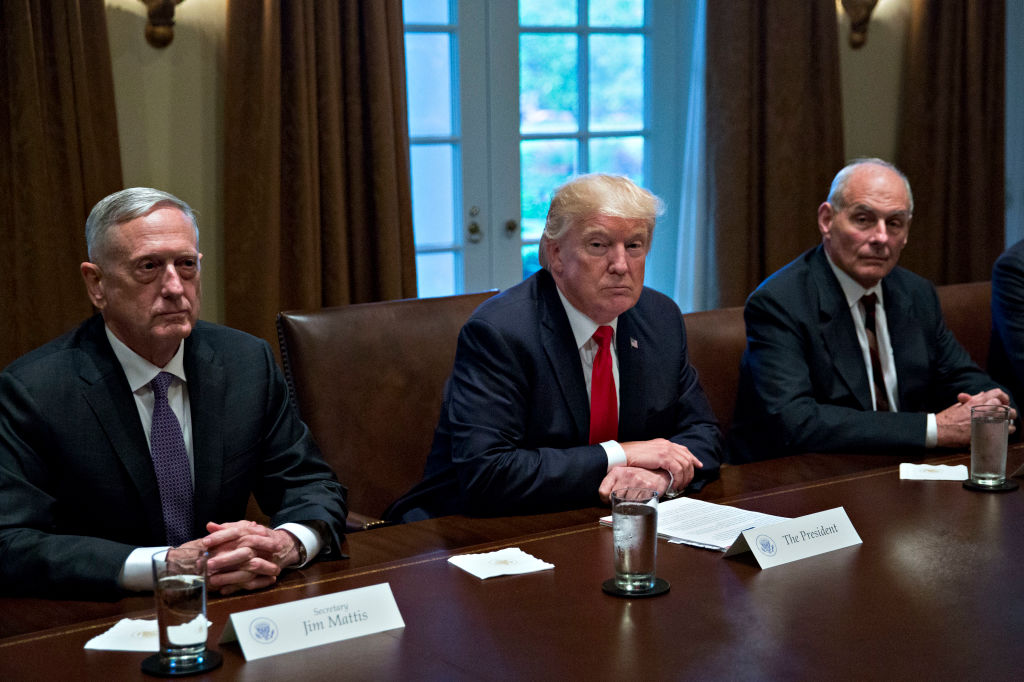Trump's previous national security team reportedly talked him out of killing Soleimani several times


A free daily email with the biggest news stories of the day – and the best features from TheWeek.com
You are now subscribed
Your newsletter sign-up was successful
It's still unclear what prompted President Trump to order the killing of Iranian Gen. Qassem Soleimani on Jan. 3. Members of Congress say they haven't been show evidence that Soleimani presented an "imminent" threat, Secretary of State Mike Pompeo has suggested "imminent" might not be the right word, and on Sunday, Defense Secretary Mark Esper and National Security Adviser Robert O'Brien walked back Trump's assertion that U.S. intelligence predicted Soleimani had planned to attack four U.S. embassies.
But it wasn't a new idea for Trump, The Washington Post reported Sunday. Trump first brought up killing Soleimani in the spring of 2017, at the start of his presidency, and he revived the idea "several times again in the months and years to follow." Esper's predecessor, retired Gen. James Mattis, "resisted any action" on Soleimani and probably "wouldn't have presented the option to the president," former White House officials told the Post. According to The New York Times, Esper and Trump's new national security team presented killing Soleimani as the "extreme" option and were shocked Trump chose it.
Mattis wasn't alone in trying to check what he viewed as Trump's rash impulses. Fellow retired Marine general John Kelly, then Trump's chief of staff, "regularly told military officials that he wanted to talk to Trump before they actually carried out one of his orders and sometimes told them to hold off," the Post reports, quoting one former senior administration who explained that Trump would "get spun up, and if you bought some time, you could get him calmed down, and then explain to him what his decision might do." Trump is now more comfortable following his instincts.
The Week
Escape your echo chamber. Get the facts behind the news, plus analysis from multiple perspectives.

Sign up for The Week's Free Newsletters
From our morning news briefing to a weekly Good News Newsletter, get the best of The Week delivered directly to your inbox.
From our morning news briefing to a weekly Good News Newsletter, get the best of The Week delivered directly to your inbox.
Trump initially passed on killing Soleimani in late December, opting instead for airstrikes that killed 25 members of an Iran-backed Iraqi militia. But when Trump watched TV coverage of militia supporters attacking the perimeter of the massive U.S. Embassy in Baghdad, "he's thinking about Benghazi" and "he's also thinking about the 1979 attack on the American Embassy in Iran that led to the hostage crisis," the Times' Helene Cooper recounts. "He's getting more and more angry, according to his aides, and then he calls for his menu of options again, and this time, he picks the extreme option," killing Soleimani.
On TV Sunday, O'Brien explained Trump's decision like this: "We made it very clear this was not going to be Tehran 1979, this was not going to be Benghazi."
A free daily email with the biggest news stories of the day – and the best features from TheWeek.com
Peter has worked as a news and culture writer and editor at The Week since the site's launch in 2008. He covers politics, world affairs, religion and cultural currents. His journalism career began as a copy editor at a financial newswire and has included editorial positions at The New York Times Magazine, Facts on File, and Oregon State University.
-
 Political cartoons for February 15
Political cartoons for February 15Cartoons Sunday's political cartoons include political ventriloquism, Europe in the middle, and more
-
 The broken water companies failing England and Wales
The broken water companies failing England and WalesExplainer With rising bills, deteriorating river health and a lack of investment, regulators face an uphill battle to stabilise the industry
-
 A thrilling foodie city in northern Japan
A thrilling foodie city in northern JapanThe Week Recommends The food scene here is ‘unspoilt’ and ‘fun’
-
 Judge blocks Hegseth from punishing Kelly over video
Judge blocks Hegseth from punishing Kelly over videoSpeed Read Defense Secretary Pete Hegseth pushed for the senator to be demoted over a video in which he reminds military officials they should refuse illegal orders
-
 Trump’s EPA kills legal basis for federal climate policy
Trump’s EPA kills legal basis for federal climate policySpeed Read The government’s authority to regulate several planet-warming pollutants has been repealed
-
 House votes to end Trump’s Canada tariffs
House votes to end Trump’s Canada tariffsSpeed Read Six Republicans joined with Democrats to repeal the president’s tariffs
-
 Bondi, Democrats clash over Epstein in hearing
Bondi, Democrats clash over Epstein in hearingSpeed Read Attorney General Pam Bondi ignored survivors of convicted sex offender Jeffrey Epstein and demanded that Democrats apologize to Trump
-
 El Paso airspace closure tied to FAA-Pentagon standoff
El Paso airspace closure tied to FAA-Pentagon standoffSpeed Read The closure in the Texas border city stemmed from disagreements between the Federal Aviation Administration and Pentagon officials over drone-related tests
-
 Judge blocks Trump suit for Michigan voter rolls
Judge blocks Trump suit for Michigan voter rollsSpeed Read A Trump-appointed federal judge rejected the administration’s demand for voters’ personal data
-
 US to send 200 troops to Nigeria to train army
US to send 200 troops to Nigeria to train armySpeed Read Trump has accused the West African government of failing to protect Christians from terrorist attacks
-
 Grand jury rejects charging 6 Democrats for ‘orders’ video
Grand jury rejects charging 6 Democrats for ‘orders’ videoSpeed Read The jury refused to indict Democratic lawmakers for a video in which they urged military members to resist illegal orders
